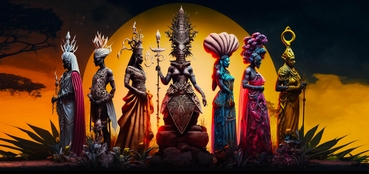
support@yorubalibrary.com
+2348073529208, 07038599574

The Yoruba religion is a rich and complex spiritual system that encompasses a vast pantheon of deities known as Orishas. These deities are central to Yoruba cosmology and play a significant role in the daily lives and practices of the Yoruba people of Nigeria. Each Orisha has unique attributes, stories, and areas of influence, reflecting the diverse aspects of life and nature.
The Foundation of Yoruba Religion
Yoruba religion, also known as Ifá, is deeply rooted in the worship of Orishas, ancestral spirits, and the supreme deity, Olódùmarè. It is a holistic system that integrates spirituality, morality, and community life.
• Olódùmarè: The supreme deity and creator of the universe, Olódùmarè is the source of all life and the ultimate authority in Yoruba cosmology. Olódùmarè is often perceived as a distant figure, with the Orishas serving as intermediaries between humans and the divine.
• Orishas: The Orishas are powerful spiritual beings that govern various aspects of the natural world and human experience. They are revered, invoked, and appeased through rituals, offerings, and festivals.
Major Orishas in Yoruba Religion
1. Obatala
• Role: Obatala is the Orisha of purity, wisdom, and creation. He is often associated with the creation of humans and is considered a symbol of peace and harmony.
• Attributes: Known for his white attire, Obatala represents purity and moral rectitude. He is often depicted as an elderly, wise figure.
• Worship: Devotees of Obatala seek his guidance for wisdom, clarity, and justice. Offerings to Obatala typically include white items such as coconuts, snail and chalk.
2. Shango
• Role: Shango is the Orisha of thunder, lightning, and fire. He is a powerful warrior deity known for his strength, virility, and justice.
• Attributes: Shango is often depicted with a double-headed axe and is associated with red and white colors. His symbols include the thunderbolt and the drum.
• Worship: Followers of Shango invoke him for protection, strength, and victory over adversaries. Offerings to Shango include roosters, red wine, and spicy foods.
3. Oshun
• Role: Oshun is the Orisha of love, fertility, and rivers. She is a benevolent deity known for her beauty, grace, and compassion.
• Attributes: Oshun is associated with freshwater, honey, and the color yellow. She is often depicted as a beautiful, youthful woman.
• Worship: Devotees of Oshun seek her blessings for love, fertility, and prosperity. Offerings to Oshun include honey, oranges, and cinnamon.
4. Ogun
• Role: Ogun is the Orisha of iron, war, and labor. He is a fierce and protective deity associated with strength, technology, and craftsmanship.
• Attributes: Ogun is depicted with weapons such as swords and machetes. His colors are green and black, symbolizing growth and power.
• Worship: Followers of Ogun call upon him for protection, success in endeavors, and guidance in work and craftsmanship. Offerings to Ogun include palm wine, red meat, and iron objects.
5. Yemoja
• Role: Yemoja is the Orisha of the sea and motherhood. She is a nurturing deity associated with fertility, family, and protection of children.
• Attributes: Yemoja is often depicted as a mermaid or a motherly figure adorned in blue and white. She symbolizes the ocean and its vast, nurturing qualities.
• Worship: Devotees of Yemoja seek her protection, guidance, and support in matters of family and fertility. Offerings to Yemoja include fish, sea shells, and white flowers.
Cultural and Spiritual Significance
The Orishas are central to Yoruba religious practices and community life. They are honored through various rituals, festivals, and ceremonies that reinforce social bonds and cultural identity.
• Rituals and Offerings: Rituals often involve music, dance, drumming, and the offering of food, drink, and other items favored by the Orishas.
• Festivals: Annual festivals dedicated to specific Orishas are important cultural events that bring communities together in celebration and worship.
• Divination: Ifá divination, conducted by priests known as Babalawos, is a key aspect of Yoruba religion. It involves seeking guidance and insights from the Orishas to address personal and communal issues.
Global Influence and Diaspora
The Yoruba religion and its pantheon of Orishas have spread beyond Nigeria, influencing spiritual practices in the African diaspora.
• Syncretism: In the Americas, Yoruba religious elements have syncretized with other religious traditions, resulting in practices such as Santería (Cuba), Candomblé (Brazil), and Vodou (Haiti).
• Cultural Exchange: The global presence of Yoruba religion fosters cultural exchange and a broader appreciation of Yoruba spiritual heritage.
Conclusion
The pantheon of Orishas in Yoruba religion represents a rich essence of spiritual beliefs, cultural values, and communal practices. Each Orisha embodies distinct qualities and domains, offering guidance, protection, and wisdom to their devotees. The enduring legacy of the Orishas continues to inspire and influence, reflecting the dynamic and resilient nature of Yoruba spirituality.

Learn about the Yoruba concept of Ìwà Pẹ̀lẹ́ (good…

Learn special praises for Divine Being and Creator…